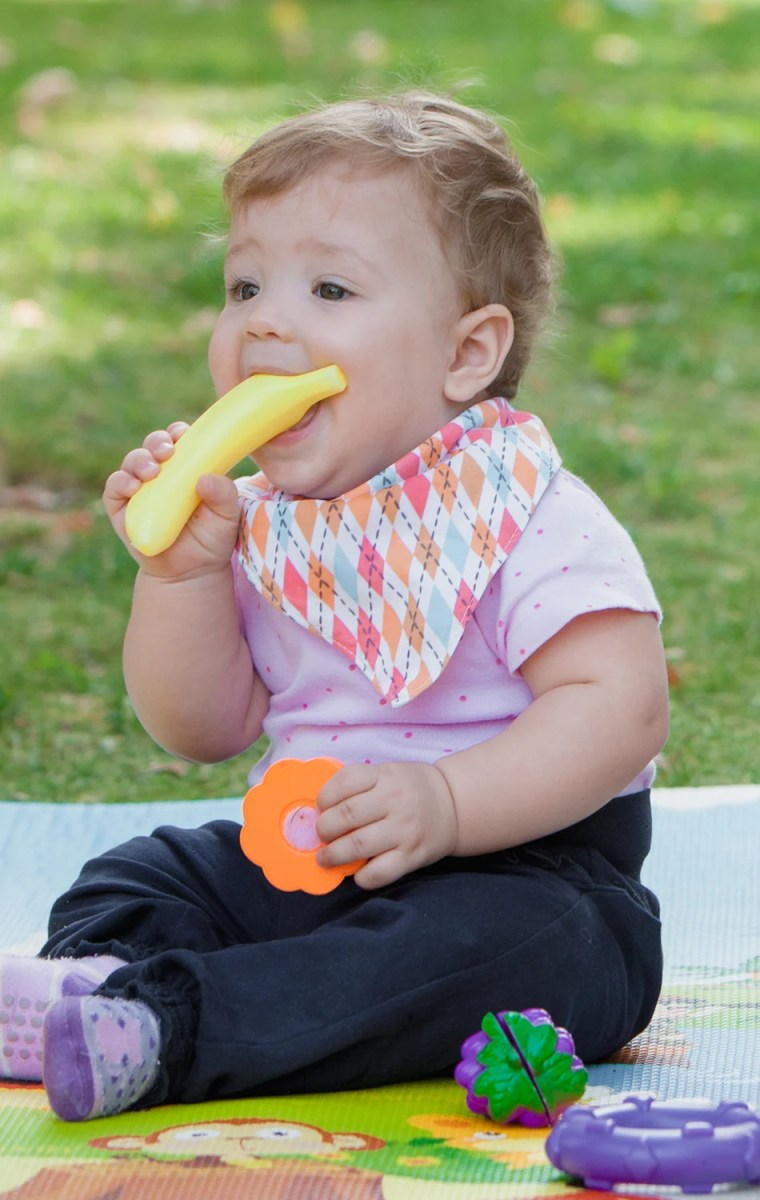Your cart is currently empty!
Congratulations! Your baby has now been out as long as they were in. Your little one is an amateur explorer, crawling everywhere they can.
Here’s What You Need To Know:
- Your baby is creeping and crawling around on their tummy.
- Your nine-month-old can use two hands to touch and play with toys.
- Your little one is working on their pincer grasp — grabbing at foods between their index finger and thumb.
- They are babbling a bunch, maybe even letting out a ‘mama’ or ‘dada’.
- They can now understand the word “no”. (Use this to your benefit!)
- Your baby can turn their head to visually track objects.
Sweetie Pies
As your baby explores solids, it may be tempting to offer them sugar filled foods. But what they eat today has far-reaching implications. Science shows that sweet tooths are made, not merely inherited. The flavors kids are exposed to in the first 1,000 days, from conception to age two, have a profound impact on what they will crave later in life. Therefore, it is important to feed them a broad array of healthy, real foods. The window is short. By their 3rd birthday, their dietary preferences are largely set. Stay the course and stay away from sugar!




1. Your Baby’s Muscles
Your baby is crawling every chance they get. Some babies crawl as early as 7 months, but 9 months is the average. If your baby is not crawling, this is totally normal. Some babies don’t crawl until 11 months. Want to encourage them to crawl? Make sure they get lots of tummy time. This will help them increase strength in their arms and abdomen. You can also place an object that they want slightly out of reach, and encourage them to reach it.
Whether your baby is learning to crawl or is moving and grooving, they’re putting lots of weight on their little bones. Therefore, our Yumi Milestone Plan focuses on supporting their muscles and bones.
2. Your Baby’s Speech
As of late, you’ve probably heard many entertaining “stories” told by your baby – and you probably haven’t understood any of it. Around 9 months, your baby is doing canonical babbling. This stage is defined by the repetition of vowels and consonants. This means that you’re going to be hearing short words such as ‘mama’, ‘dada’ and ‘baba’. While they’re finally saying ‘words;’ it’s likely that your little one is associating multiple people and/or objects with a single word. It’s important to continue talking to your baby and pointing objects out in order to encourage further vocabulary and language acquisition.
3. Your Baby’s Brain
While the games you play with your baby seem trivial, they actually have a huge impact on developing learning and thinking abilities. Playing peek-a-boo with your little one will help them understand object permanence. Up until this point, your baby might not understand that just because they can’t see an object, doesn’t mean it’s not there. Music also plays a role in your baby’s development. New research from the University of Washington shows that play sessions with music improved babies’ brain processing.
At 9 months, babies also learn about the connection between pictures and real objects. According to a study in the journal Child Development, researchers found that babies under 1-years old can learn about a toy from a picture.
4. Your Baby’s Immunity
At this age, everything your baby touches ends up in their mouth. Believe it or not, this is a good thing. It is a way of building up their immune system and learning about the world.
If you are home, and their pacifier falls on the floor, it’s totally OK to pop it back into their mouth. A study of 184 children showed that parents who licked the pacifier and put it back in had healthier kids. They had fewer allergies, asthma, and eczema. So, let your kid eat dirt–and while you’re at it, fruits and leafy greens.
Pint Sized & Picky
Is your ‘good eater’ turning into a ‘picky eater?’ One way to get your baby to accept new foods is to combine them with something familiar. And remember: no sugar or salt. Kids that get used to sweet and salty foods are at a higher risk for a slew of metabolic and cardiovascular diseases, such as obesity, diabetes and hypertension.

Summary
Your baby’s brain is growing substantially every day, and it is crucial that they get the nutrients vital for its development. As your little one plays peek-a-boo, picks up their toys, and puts EVERYTHING into their mouths – they are hitting important milestones.
Make sure to support and encourage them (“yay” “good job!”) as they figure out how to sit up and grab their toys. Place your baby close to soft furniture, that they can pull themselves up on and set their toys on top of. They will be walking and talking before you know it!











